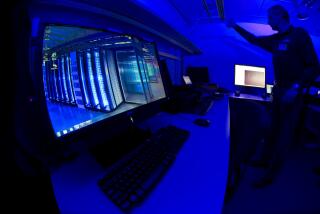Virus Fizzles as Major Menace to Data Banks
- Share via
A much dreaded “Friday the 13th” computer virus, with the potential to wipe out caches of data stored in millions of personal computers, failed to wreak the havoc that some expected. Only a handful of “infections” were reported around the world Friday.
And some experts doubted whether those problems were actually from the Friday the 13th virus strain or similar electronic infections that plague personal computers.
“There were no confirmed sitings of Friday the 13th,” said Arthur Hill, a spokesman for International Business Machines, whose computers are among the primary targets of the virus. However, other sources claimed that there were some certified outbreaks in Europe and in the United States.
According to one report, the virus was discovered in about 10% of the personal computers in the Micro Resource Center at the University of Illinois in Urbana. The virus was contained before it spread to other machines, authorities said.
In London, the virus apparently struck five or six computers at the Royal National Institute for the Blind before steps were taken to halt its spread.
Winn Schwartau, owner of a computer security company in Nashville, Tenn., said he had been contacted by more than a dozen companies, including some with hundreds of PC installations, that claimed to have been struck by the virus. However, Schwartau, whose security products sell for upward of $600, declined to name the firms, and his comments could not be independently verified.
Although obviously cheered by the outcome, computer security experts said they could not decide whether to credit the tremendous precautions taken by corporations to screen the virus, or whether to believe that the extent of the virus’ spread had been blown out of proportion by those hoping to cash in on the paranoia and insecurities it aroused in computer users.
“It was a dud,” said John McAfee, executive director of the Computer Virus Industry Assn. in Santa Clara, Calif., and an outspoken critic of the latest flurry of anti-virus activities. “It was blown way out of proportion.”
The Friday the 13th virus generated unprecedented publicity and activity since its discovery about six weeks ago. The virus, created in Northern Europe earlier this year, is considered especially pernicious because it can wipe out the instructions governing how information is stored on the hard disks of certain PC models, rendering their contents completely inaccessible.
The virus was aimed at IBM personal computers and compatible models, which account for about 90% of the estimated 35 million personal computers in use.
Electronic viruses are software programs that are deliberately inserted in legitimate programs. In addition to containing hidden instructions that can cripple the operations of the computer, these rogue programs are capable of reproducing themselves endlessly, either through computer networks or the sharing of infected computer disks.
Because rumors of the virus began circulating six weeks ago, many corporations and individuals were able to screen their machines well before the virus was set to trigger at midnight Thursday.
An IBM spokesman said the company had received more than 1,700 calls on its toll-free hot line set up to advise customers. Ashton-Tate, the Torrance software publishing house, checked all of its PC installations last week, and security officials at Caltech screened campus machines several weeks ago.
At Hughes Aircraft Co.’s Ground Systems Group in Fullerton, a sprawling defense plant with about 4,000 IBM-compatible personal computers, officials said they took precautions, and were pleased with the results.
“It didn’t show up, and we’re thankful for that,” said Mary Howlett, manager of office automation. “We did a lot of preparation ahead of time and were ready. It was a very good experience for us.”
But there’s at least one fellow in New York who is still wishing he could blame the virus for his computer problems.
It seems that when Charles Brimmer, the New York bureau chief for the London Times, turned on his spanking new IBM personal computer Friday morning, he discovered that its hard disk instructions had been eradicated, just as the Friday the 13th virus would have done. However, the virus did not leave its traditional tell-tale message notifying the owner that he had been zapped.
Nonetheless, Brimmer wants to believe he was struck by the dreaded virus.
“It happened just as I was writing a story about computer crime,” he said. “It could be pure chance. But I kind of hope it was the virus. It makes a better story.”
Times staff writer David Olmos, in Orange County, contributed to this story.





